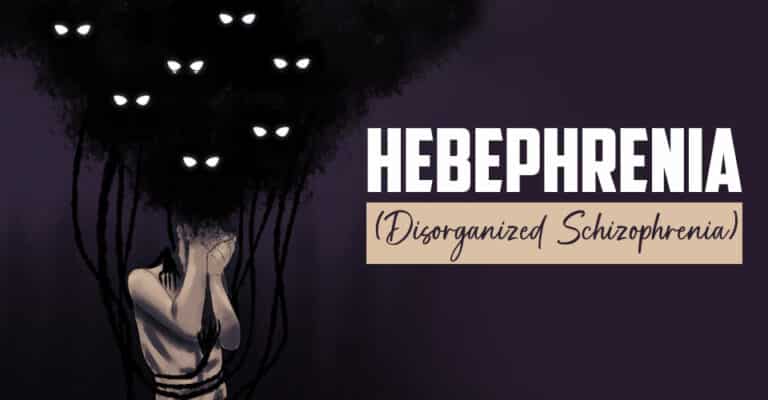Hebephrenia, also referred to as disorganized schizophrenia, is a distinct subtype of schizophrenia. It is characterized by disorganized thinking, speech, and behavior, along with flat or inappropriate emotional responses. People with hebephrenic schizophrenia commonly struggle to organize their thoughts and may exhibit inappropriate laughter or engage in silly behaviors.
What is Disorganized Schizophrenia
Individuals with disorganized schizophrenia often demonstrate 1 Disorganized schizophrenia (Concept Id: C0036347) – MedGen – NCBI. (n.d.). Www.ncbi.nlm.nih.gov. Retrieved July 17, 2023, from https://www.ncbi.nlm.nih.gov/medgen/48577#:~:text=Disorganized%20Symptoms%20Predicted%20Worse%20Functioning%20Outcome%20in%20Schizophrenia%20Patients%20with%20Established%20Illness.&text=Prevalence%20of%20aggression%20in%20hospitalized a discordance among their thought, emotion, and behavior. Hebephrenia examples include a struggle to organize thoughts, resulting in incoherent speech, inappropriate emotional responses, and unpredictable behavior. Their inability to form coherent or logical thoughts leads to disorganized speech, sometimes abruptly switching to unrelated topics during conversations.
Hebephrenia affects approximately 1% 2 Patel, K. R., Cherian, J., Gohil, K., & Atkinson, D. (2014). Schizophrenia: overview and treatment options. P & T : a peer-reviewed journal for formulary management, 39(9), 638–645. of the population and is more commonly observed during the early stages of the condition, typically between 3 Picchioni, M. M., & Murray, R. M. (2007). Schizophrenia. BMJ (Clinical research ed.), 335(7610), 91–95. https://doi.org/10.1136/bmj.39227.616447.BE the ages of 15 and 25. An earlier onset of hebephrenia is traditionally associated with a less favorable prognosis, characterized by lower educational achievement, more prominent disorganized schizophrenia symptoms, and cognitive impairments.
Read More About Schizophrenia Here
Signs and Symptoms of Disorganized Schizophrenia
The following are the symptoms commonly associated 4 Disorganized Schizophrenia – an overview | ScienceDirect Topics. (n.d.). Www.sciencedirect.com. Available from: https://www.sciencedirect.com/topics/medicine-and-dentistry/disorganized-schizophrenia with hebephrenic schizophrenia:
1. Disorganized Speech
It is sometimes referred to as clanging and can disrupt concentration and the ability to maintain a coherent train of thought, resulting in speech patterns that are difficult to comprehend.
Signs of disorganized speech include:
- Loosening of associations that refer to rapidly shifting between topics with no connection between topics
- Perseveration or repetitions of the same things over and over again
- Making up words that only have meaning to the speaker
- Use of rhyming words without meaning
- When the cognitive disorganization is severe, it can be impossible to understand what the person is saying
2. Disorganized Behavior
Hebephrenia can negatively affect any goal-directed behavior. The signs of disorganized behavior are as follows:
- A decline in overall daily functioning
- Unpredictable or inappropriate emotional responses
- Lack of impulse control
- Behaviors that appear bizarre or lack purpose
- Routine behaviors severely impaired or lost such as bathing, dressing, or brushing teeth
3. Inappropriate Affect
People with this condition display a flat affect which means that they display little or no emotions in their facial expressions, voice tone, or mannerisms. Sometimes they express their affect in an inappropriate manner that does not go with the situation such as laughing at something sad. People with this disorder are likely to experience other disorganized schizophrenia symptoms such as failing to make eye contact along with a lack of emotional expression.
Causes of Hebephrenia (Disorganized Schizophrenia)
The development of hebephrenia may involve 5 Endres, D., Matysik, M., Feige, B., Venhoff, N., Schweizer, T., Michel, M., Meixensberger, S., Runge, K., Maier, S. J., Nickel, K., Bechter, K., Urbach, H., Domschke, K., & Tebartz van Elst, L. (2020). Diagnosing Organic Causes of Schizophrenia Spectrum Disorders: Findings from a One-Year Cohort of the Freiburg Diagnostic Protocol in Psychosis (FDPP). Diagnostics (Basel, Switzerland), 10(9), 691. https://doi.org/10.3390/diagnostics10090691 significant factors, such as:
1. Genetic Factors
Genetic studies have shown that individuals who have close relatives 6 Wahbeh, M. H., & Avramopoulos, D. (2021). Gene-Environment Interactions in Schizophrenia: A Literature Review. Genes, 12(12), 1850. https://doi.org/10.3390/genes12121850 with schizophrenia have a higher risk of developing the disorder themselves compared to the general population. The risk increases further if the affected relative is a first-degree family member, such as a parent or sibling.
Read More About Genetics Here
2. Chemistry and Brain Structure
Imbalances in key neurotransmitters 7 Sheffler, Z. M., & Leela Sharath Pillarisetty. (2019, June 4). Physiology, Neurotransmitters. Nih.gov; StatPearls Publishing. Available from: https://www.ncbi.nlm.nih.gov/books/NBK539894/ , including dopamine, glutamate, and serotonin, can impact how the brains of individuals with hebephrenia respond to sensory stimuli such as sights and sounds. This can potentially account for their heightened sensitivity to loud noises, bright lights, and the occurrence of hallucinations. Furthermore, disruptions in brain connectivity are believed to play a significant role in developing disorganized schizophrenia.
3. Paternal Age
Some research suggests that the risk of developing 8 Lan, K. C., Chiang, H. J., Huang, T. L., Chiou, Y. J., Hsu, T. Y., Ou, Y. C., & Yang, Y. H. (2021). Association between paternal age and risk of schizophrenia: a nationwide population-based study. Journal of assisted reproduction and genetics, 38(1), 85–93. https://doi.org/10.1007/s10815-020-01936-x disorganized schizophrenia may be higher for individuals who are the first child of either younger or older parents compared to those born to parents aged 25-29 years.
4. Maternal Infection During Pregnancy
Maternal viral infections 9 Brown, A. S., & Patterson, P. H. (2011). Maternal infection and schizophrenia: implications for prevention. Schizophrenia bulletin, 37(2), 284–290. https://doi.org/10.1093/schbul/sbq146 , such as influenza, measles, rubella, or polio during pregnancy’s first and second trimesters, have been associated with an increased risk of hebephrenia. These viruses can potentially impact the fetal brain and its development.
5. Prenatal Malnutrition
There is evidence to suggest that inadequate maternal nutrition 10 Onaolapo, O. J., & Onaolapo, A. Y. (2021). Nutrition, nutritional deficiencies, and schizophrenia: An association worthy of constant reassessment. World journal of clinical cases, 9(28), 8295–8311. https://doi.org/10.12998/wjcc.v9.i28.8295 during pregnancy can elevate the risk of developing disorganized schizophrenia.
6. Substance Use
The recreational use of drugs 11 Winklbaur, B., Ebner, N., Sachs, G., Thau, K., & Fischer, G. (2006). Substance abuse in patients with schizophrenia. Dialogues in clinical neuroscience, 8(1), 37–43. https://doi.org/10.31887/DCNS.2006.8.1/bwinklbaur during adolescence has been linked to the development of disorganized schizophrenia. The earlier individuals start using drugs and drug abuse more frequently, the higher the likelihood of developing this condition.
7. Severe Stress
Severe stress can be a contributing factor 12 Betensky, J. D., Robinson, D. G., Gunduz-Bruce, H., Sevy, S., Lencz, T., Kane, J. M., Malhotra, A. K., Miller, R., McCormack, J., Bilder, R. M., & Szeszko, P. R. (2008). Patterns of stress in schizophrenia. Psychiatry research, 160(1), 38–46. https://doi.org/10.1016/j.psychres.2007.06.001 in the onset and exacerbation of symptoms in individuals who are already predisposed to schizophrenia due to genetic or other factors.
Read More About Stress Here
How to Diagnose Hebephrenia (Disorganized Schizophrenia)
In diagnosing hebephrenia, licensed therapists often refer to the diagnostic criteria outlined in the DSM-5. A patient must exhibit at least two 13 Patel, K. R., Cherian, J., Gohil, K., & Atkinson, D. (2014). Schizophrenia: overview and treatment options. P & T : a peer-reviewed journal for formulary management, 39(9), 638–645. of the primary symptoms of the disorder, such as delusions, hallucinations, disorganized speech and behavior, catatonia, and negative symptoms, consistently for a month or longer.
The Diagnostic and Statistical Manual of Mental Disorders (DSM 5) has laid out the following diagnostic approaches 14 Jablensky A. (2010). The diagnostic concept of schizophrenia: its history, evolution, and future prospects. Dialogues in clinical neuroscience, 12(3), 271–287. https://doi.org/10.31887/DCNS.2010.12.3/ajablensky for this disorder:
- A thorough interview with the individual to gather information about their symptoms, medical history, and family history of mental health conditions.
- The professional would observe the individual’s behavior, speech, and thought processes to identify any disorganized or inappropriate responses.
- Psychological tests like 15 Kumari, S., Malik, M., Florival, C., Manalai, P., & Sonje, S. (2017). An Assessment of Five (PANSS, SAPS, SANS, NSA-16, CGI-SCH) commonly used Symptoms Rating Scales in Schizophrenia and Comparison to Newer Scales (CAINS, BNSS). Journal of addiction research & therapy, 8(3), 324. https://doi.org/10.4172/2155-6105.1000324 the Positive and negative syndrome scale and Clinical global impression-Schizophrenia can also be used to assess the cognitive functioning and emotional state of the individual.
Treatment for Disorganized Schizophrenia (Hebephrenia)
Initiating treatment as early 16 Patel, K. R., Cherian, J., Gohil, K., & Atkinson, D. (2014). Schizophrenia: overview and treatment options. P & T : a peer-reviewed journal for formulary management, 39(9), 638–645. as possible is vital for achieving recovery in cases of disorganized schizophrenia. Treatment for this condition involves the following elements:
1. Medication
Medication for hebephrenia aims to reduce symptoms such as hallucinations, delusions, paranoia, and disordered thinking. The selection of appropriate medication depends on the specific symptoms experienced by the individual.
2. Psychotherapy
Cognitive Behavioral Therapy (CBT) is recommended to 17 Morrison A. K. (2009). Cognitive behavior therapy for people with schizophrenia. Psychiatry (Edgmont (Pa. : Township)), 6(12), 32–39. address the evidence for an individual’s beliefs, identify cognitive distortions, and develop alternative, more rational perspectives. By challenging delusions and hallucinations, individuals can reduce their distress and gain a clearer understanding of reality.
Read More About Psychotherapy Here
3. Life Skills Training
Assistance with life skills helps 18 Kopelowicz, A., Liberman, R. P., & Zarate, R. (2006). Recent advances in social skills training for schizophrenia. Schizophrenia bulletin, 32 Suppl 1(Suppl 1), S12–S23. https://doi.org/10.1093/schbul/sbl023 individuals with disorganized schizophrenia improve their social interactions and enhance their abilities in daily living tasks, with the ultimate goal of fostering independence.
4. Supported Employment Services
Providing training in finding and maintaining 19 Drake R. E. (2018). Employment and Schizophrenia: Three Innovative Research Approaches. Schizophrenia Bulletin, 44(1), 20–21. https://doi.org/10.1093/schbul/sbx170 employment is beneficial for individuals with disorganized schizophrenia, facilitating their integration into the workforce.
5. Family Education and Support
Educating family members 20 Ferliana, H., Damayanti, N. A., Aisyah, D. N., Huda, N., & Ernawati, D. (2020). Determinants of family independence in caring for hebephrenic schizophrenia patients. Journal of public health research, 9(2), 1828. https://doi.org/10.4081/jphr.2020.1828 about treatment plans and guiding them on how to support their loved ones with schizophrenia is essential. Family support enhances understanding of the disorder and equips family members with coping strategies.
Recovery from Hebephrenia (Disorganized Schizophrenia)
Symptoms of disorganized schizophrenia typically 21 Strauss, G. P., Harrow, M., Grossman, L. S., & Rosen, C. (2010). Periods of recovery in deficit syndrome schizophrenia: a 20-year multi-follow-up longitudinal study. Schizophrenia bulletin, 36(4), 788–799. https://doi.org/10.1093/schbul/sbn167 emerge gradually and persist long-term. However, with consistent and appropriate treatment, individuals with disorganized schizophrenia can experience an improvement. An array of approaches, such as medication, psychotherapy, support with daily living skills, educational pursuits, and family support can positively influence, and lead to improved outcomes for further living in the mainstream society.
Takeaway
Hebephrenia, a subtype of schizophrenia, is characterized by disorganized thinking, speech, and behavior. While recovery may vary, a comprehensive treatment for disorganized schizophrenia including medication, psychotherapy, social support, and life skills training can significantly improve symptoms and overall functioning, enhancing the quality of life for individuals with hebephrenia.
At A Glance
- Hebephrenia, also known as disorganized schizophrenia, is a subtype of schizophrenia.
- Hebephrenia examples refer to disorganized behavior and speech and include disturbance in emotional expression.
- The primary symptoms of hebephrenia are difficulty maintaining eye contact and displaying a blunted facial expression.
- The development of this disorder may involve significant contributions from the areas such as genetic factors, age, daily life stress, etc.
- To diagnose hebephrenia, medical professionals employ various methods, including physical examinations, screening tests, etc.
- Treatment for disorganized schizophrenia involves a comprehensive multimodal approach.
Frequently Asked Questions (FAQs)
1. Is hebephrenia curable?
There is no currently known cure for hebephrenia in general, it is important to note that significant improvements can be achieved through proper treatment and management.
2. What is the hebephrenic syndrome?
The hebephrenic syndrome is characterized by difficulties in daily functioning, impaired social interactions, and a higher prevalence of negative symptoms, such as reduced motivation and emotional expression.
3. Does someone with schizophrenia know they have it?
Many people with schizophrenia are unaware that their symptoms indicate a loss of insight. Despite the impact on their lives, they may see their experiences as normal or believe they have unique insights others can’t understand, viewing it as either a blessing or a curse.














